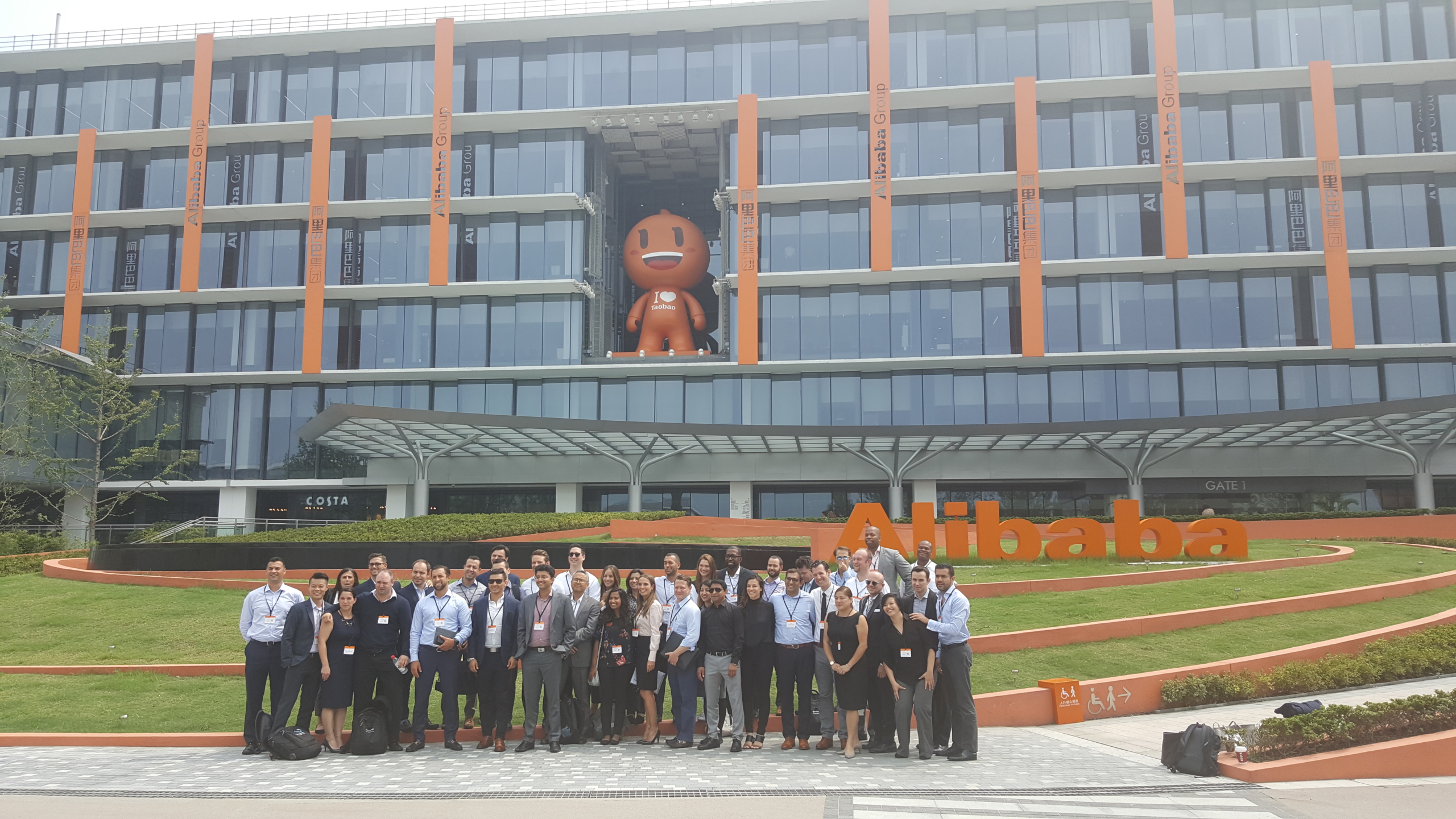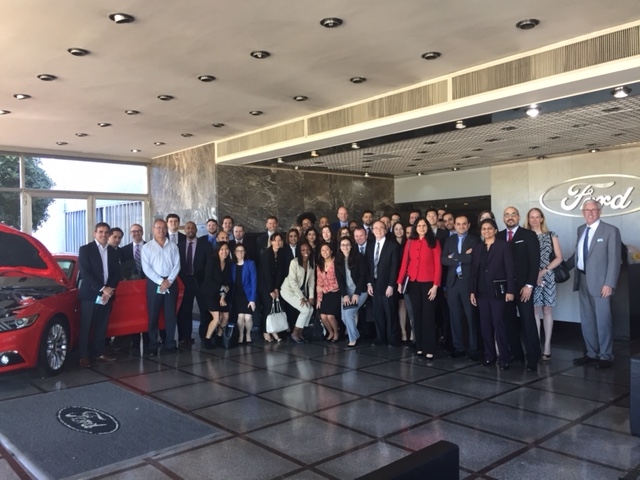
Members of the EMBA Class of 2021 at orientation
P&Q: What is the most underrated part of your program that you wish prospective students knew more about?
RS: “One of the most valuable aspects of our program, as we often hear from current students and alumni, is Stern’s collaborative community. For each incoming class, our Admissions team carefully recruits and selects experienced executives with an average of 12 years of work experience. Students become part of a senior cohort of peers from a diverse range of industries and learn from each other as well as Stern’s top faculty, who are handpicked to teach in the EMBA Program.
Students end up building a life-long professional network in the program that extends into our vibrant alumni community. And, with the addition of our DC program, we’ve deepened the engagement of Stern alumni based in Washington who now have access to even more local events and featured speakers.”
P&Q: How has the program changed in the past three years?
RS: “In addition to the exciting curriculum updates I noted earlier, we are also now incorporating service-learning projects into our Global Study Tour (GST) courses. For example, students who attended the GST in Buenos Aires with Professor Tensie Whelan, Director of Stern’s Center for Sustainable Business, had the opportunity to volunteer and build sustainable water heaters for low-income neighborhoods. The GST is required in the first year of the DC and NY programs and is a popular component of the New York and DC curriculum.
As part of our ongoing efforts to offer an innovative range of options to meet diverse student needs, we are also piloting pre-program primers online, including one focused on quantitative skills and another on accounting.”

Members of a Global Study Tour (GST)
BIG OPPORTUNITY IN THE BIG APPLE
What drew the Class of 2021 to the Stern EMBA program specifically? The location certainly helps. The campus is just 20 minutes from Wall Street and Midtown each way. That provides students with close proximity to the best minds in finance, fashion, advertising, real estate, and the arts.
“There is just something about NYU Stern, Washington Square Park, and the West Village that cannot quite be put into words,” writes Marc Schlesinger. “From the earliest NYU information sessions, it was clear that the students were not concentrated in any one industry or limited to a certain type of background. Rather, the students’ backgrounds and experiences (personal and professional) were as diverse as the city itself.”
Still, New York City is known as the ‘financial capital of the world,’ thanks to being home to the NYSE and leading financials like Goldman Sachs and Morgan Stanley. Not surprisingly, NYU Stern has capitalized on the resources and expertise around it, emerging as a premier business school for finance. For Ramesh Vaddi, who hopes to someday launch a social enterprise, Stern’s intertwined finance and impact programming was too good to pass up.
“NYU Stern was the first business school to launch the FinTech specialization in its traditional two-year and part-time MBA programs,” he explains. “As an EMBA student, I have the opportunity to access elective courses in Fintech both in the EMBA curriculum and the Langone Part-time MBA program. This coursework provides a unique platform to hone technology skills while really strengthening the finance foundation, which is especially applicable to me with my interest areas in information technology, product development and management, and social entrepreneurship.”
IQ+EQ
Astu Patel was attracted to another differentiator that’s equally fundamental to the Stern experience: IQ+EQ. It is a philosophy that values interpersonal skills in equal measure to intelligence. By focusing on recruiting and growing students with strong self-awareness, communication skills, and empathy, the school creates a welcoming learning environment that brings out each person’s best. The IQ+EQ philosophy also prepares EMBAs to take the next step in their leadership development, where interpersonal acumen will overshadow their technical skills.
“IQ+EQ is at the core of Stern’s values,” Patel asserts. “I felt a deep connection to Stern’s impact-oriented approach and application of business leadership to influence those around us. Stern’s ability to bridge academic excellence with practical applications was very important to me. After all, there is little value to equip yourself with best-in-class education if you can’t extract its full potential.”

EMBA study team
That nagging feeling – the sense that they had fallen into a rut and may squander that potential – also motivated the Class of 2021 to return to campus. Ramesh Vaddi called it an “inflection point,” an epiphany that his experience wasn’t going to be enough to put him in a position to “do something big.” That same thought gnawed at Astu Patel. She had planned to get her MBA after earning an engineering degree, but “life happened and I waited longer than I wanted.” Although she is now making up for lost time at Stern, she also understands that her career brings a “unique value proposition” to her learning.
“I have gained rich experience upon which I can build,” she writes. “The majority of my career has been on the technology side of the equation. To achieve an optimal balance, it is critical to understand the big picture – the entire equation thoroughly. With the way things are trending around us, technology will continue to shape our lives. Without an in-depth understanding of business motivations, I felt like I would be continuing with partial information. I would hit a ceiling in my ability to scale my impact at the pace that I desire.”
ACCEPTING THE INEVITABLE: YOU WILL FALL SHORT
One way that EMBAs can make that impact, adds Matthew Meade, is by applying what they learn immediately at work. “I’ve always been a strong believer that on-the-job experience is a great way to learn concepts specific to the role you are in. However, after working in the industry for several years, I recognize now more than ever that learning key fundamentals through education and then being able to apply those skills in the workplace would propel me towards achieving my overall career goals.”
Alas, no one really wants to go back to school. They’re not being paid for it – even if employers are bearing some of the cost. It’s not easy to squeeze school into their filled-up schedule. In full-time programs, MBAs always talk about FOMO – Fear of Missing Out. In EMBA programs, there is POMO – the Probability of Missing Out. An EMBA may be a second Master’s degree in time management, but there will always be jugging. There will always be sacrifices. Sometimes, something will suffer, be it family, work, or school.
How have the Class of 2021 worked around these hurdles? Astu Patel decided to hold off returning to school until her two daughters were older and less demanding. After she moved to New York City, she diligently prepared a team that could operate in her absence.

GST team in Buenos Aires
“I tirelessly spent the first year building a new team and putting in place effective tools and processes,” she explains. “Having been in the role for two years at the time of my application, I felt assured in my domain knowledge and established team. I also waited until I had a leader with whom I was able to build mutual trust and felt comfortable taking the required time outside of the office to attend classes.”
LEARNING TO SAY “NO”
Ramesh Vaddi spends three-to-four days a week traveling for client meetings and prospecting. To ensure he devotes enough time to class reading and preparation, he has carved out a schedule that reflects his commitments and priorities. “I follow a very strict calendar-based schedule for my school, professional and personal commitments, with clearly marked study hours during weekdays and weekends. I also make it a point to spend quality time with my wife and boys on Sundays, which rewinds and charges me up for the coming week.”
Astu Patel takes organization to another level, designing a routine geared towards maximizing time. “I have strategically planned to have everything I need daily within a one-block radius: work, apartment, school and after-school activities for my kids, grocery stores, etc. I do my best to not overextend myself, while building in planned compromises. This means I will not be able to attend all the happy hours with my classmates because I have a family waiting for me, occasionally miss my daughter’s music performance because I have a final exam to write, and cut short my business trips to be back in NYC to attend class Fridays.”
In contrast, Jessie Spielvogel has found the most effective tool is often the most effective: learning to say no. “My friends and family have been very supportive of the fact that I am heads down studying if I am not at work, which has made this experience much more manageable. The hardest part has been saying no to some things I want to do (like some vacations and long-weekend activities)! But I remind myself that I’m investing in my future and that my friends, family, and job support me. That’s all that matters for the next two years.”
What led the Closs of 2021 to enroll in an EMBA program? What are their biggest challenges? What do they love most about business school? Click on the links below for detailed profiles of members of the NYU Stern EMBA Class of 2021.
DON’T MISS: 100 BEST & BRIGHTEST EXECUTIVE MBAS: CLASS OF 2019
| MBA Student | Hometown | Alma Mater | Employer |
|---|---|---|---|
| Priya Jayanthi | Jersey City, NJ | National Institute of Technology | Credit Suisse |
| Matthew Meade | South Orange, NJ | University of Virginia | JP Morgan Chase & Company |
| Jed Morris | Atlanta, GA | Wayland Baptist University | U.S. Air Force |
| Astu Patel | Scottsdale, AZ | University of Arizona | American Express |
| Geraldine Ramos | Honolulu, HI | University of Hawaii at Manoa | American Eagle Outfitters |
| Marc Schlesinger | Edison, NJ | University of Maryland | Vedder Price P.C. |
| Jessie Spielvogel | The Woodlands, TX | Texas State University | Fenton Communications |
| Ramesh Vaddi | Boston, MA | OEC, Utkal University | Cognizant |





Questions about this article? Email us or leave a comment below.